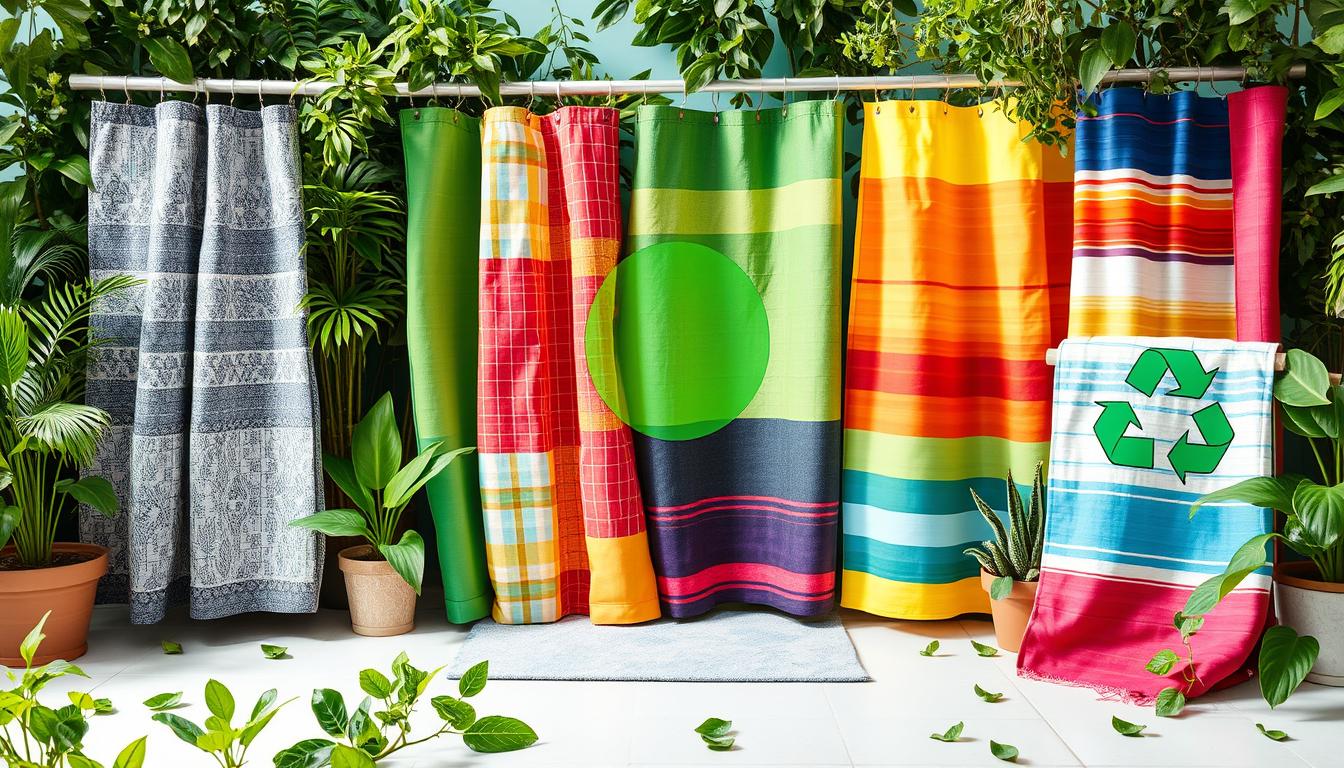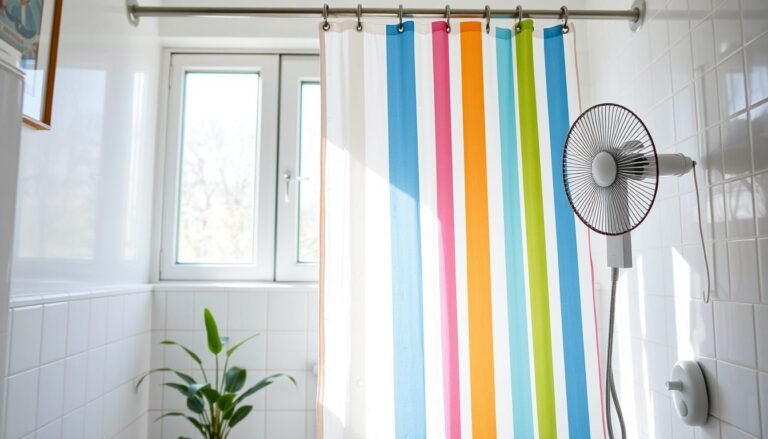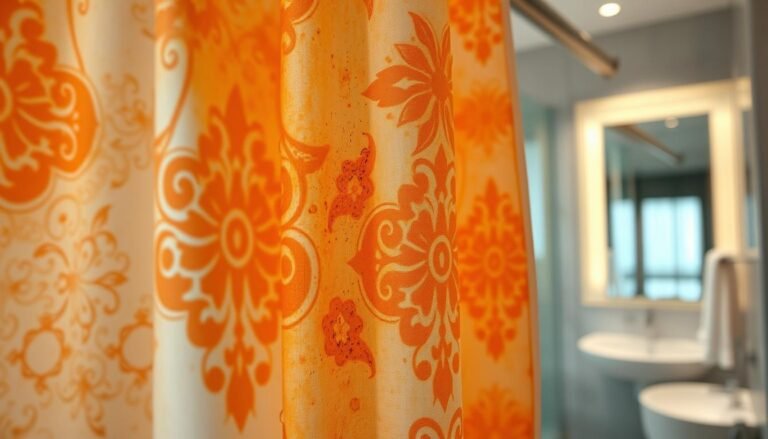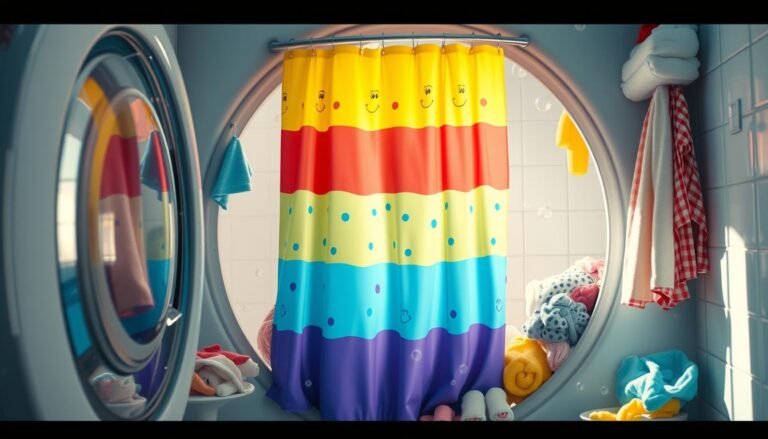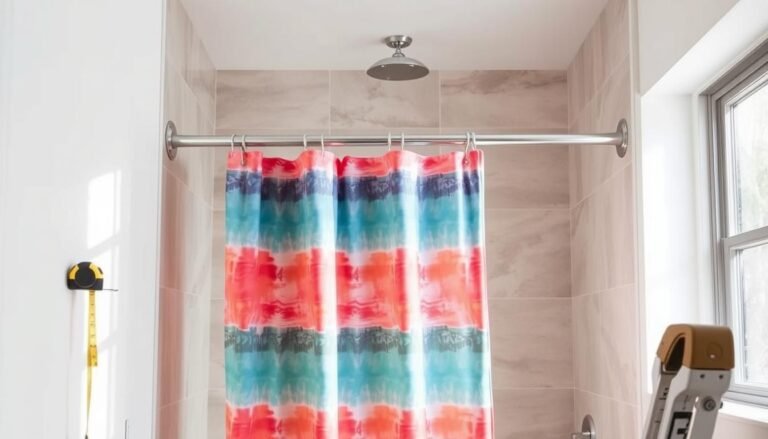Recycling Shower Curtains: What You Need to Know
Trying to live greener, you may find recycling shower curtains tricky. Most are made of PVC (polyvinyl chloride), also known as plastic #3. This type is hard to recycle because it can damage recycling machines.
When PVC is heated, it releases harmful hydrochloric acid. So, recycling centers can’t handle it. But, you can use TerraCycle’s Bathroom Accessories Zero Waste Box. It’s a bit costly, starting at $118. Switching to curtains made of washable polyester or natural fibers like cotton helps.
Making smart choices cuts down plastic waste and helps our planet. Moving to eco-friendlier bathroom products is a big move towards a greener lifestyle and mindful living.
Why Recycling Shower Curtains is Important
Recycling shower curtains helps reduce plastic waste and supports green home decor. Only 9 percent of all plastic gets recycled. This shows why it’s vital to adopt sustainable habits. Most shower curtains are made of PVC, a tough material for recycling centers to handle.
Reducing Plastic Waste
Each year, over 300 million tons of plastic are produced worldwide. But only 10 percent is recycled. PVC contains harmful additives that can spoil the recycling process of other plastics. Thus, choosing shower curtains made of materials like polyester, which can be recycled, helps cut down on plastic waste.
- Polyester liners are a sustainable alternative to PVC liners as they are recyclable.
- Sustainable alternatives help in reducing the overall plastic waste generated.
Environmental Impact of PVC
PVC, or plastic No. 3, is tough to recycle. When heated, PVC emits hydrochloric acid (HCL) which harms recycling machinery and other plastics. Switching to eco-friendly shower curtains reduces these harmful effects on the environment.
- Only about 14% of plastic gets recycled globally, compared with much higher rates for materials like glass and paper.
- Recycling processes for PVC can lead to the release of harmful chemicals, making it crucial to seek alternatives.
Are Shower Curtains Recyclable?
Shower curtains are hard to recycle because of what they’re made from. Many are made of polyvinyl chloride (PVC), or plastic No. 3. This type of plastic is tough to handle in city recycling systems. When heated, it releases harmful chemicals like hydrochloric acid (HCl). These chemicals can ruin recycling machines and mix badly with other materials.
Challenges with Recycling PVC
Recycling PVC comes with big hurdles. It’s a widely used plastic but local places often can’t recycle it. This is a big issue. Adding things like softeners to PVC can make other plastics less valuable for recycling. Also, shower curtains can hold more bacteria than many spots at home, SafeHome.org says. This makes recycling them even harder.
Alternative Recycling Methods
There are new ways to deal with PVC recycling issues. For example, TerraCycle’s Bathroom Accessories Zero Waste Box lets you recycle shower curtains. But, it’s pricy with small boxes at $118. For those seeking greener choices, polyester liners are recyclable. Cotton or hemp curtains might be compostable. The growth of programs like TerraCycle gives hope for solving PVC recycling challenges.
Eco-Friendly Shower Curtain Alternatives
Choosing eco-friendly shower curtains is a solid step towards green living. It’s helpful to know about the various eco-friendly bathroom items out there. We will look at some top picks for shower curtains that aren’t made of PVC.
Polyester Shower Curtains
Polyester curtains are a good pick over PVC ones. They can be recycled and you can clean them in your washing machine. This makes them last longer and they’re easy to care for. Parachute sells high-quality ones, with prices between $50 and $128. This price range makes them affordable for eco-friendly shoppers.
Cotton and Hemp Curtains
Cotton and hemp are great for eco-friendly bathrooms. They’re natural and reduce your environmental impact. They also won’t cause allergies and have natural antibacterial qualities. Bean Products offers organic curtains that you can wash and don’t leak, costing $39 to $256. Coyuchi keeps almost 44,000 pounds of waste out of dumps with their take-back program.
Shower Screens and Doors
For a lasting solution, consider shower screens and doors. These are often made of glass and don’t get moldy or mildew. They can be good for many years if you take care of them properly. Even though they might end up in landfills, their durability makes them a greener choice than one-use curtains.
By picking these green shower curtain options, you’ll help the planet. Whether you go for polyester, natural fabrics, or fixed screens, each has benefits. They’re good for the earth and for your home too.
Ways to Dispose of Old Shower Curtains Responsibly
It’s important to dispose of shower curtains properly. This helps cut down on environmental harm. With 128 million U.S. households, managing the waste from plastic shower curtains is key. If 10% of households change their liners every two years, 6 million sheets of plastic end up in trash each year.
Using TerraCycle Services
One good way to dispose of shower curtains is by using TerraCycle. They offer a Bathroom Accessories Zero Waste Box. This lets people send non-recyclable bathroom items, like shower curtains, for recycling at a fee. This approach helps lessen the trash going to landfills.
Donating or Repurposing
Donating or repurposing shower curtains is another smart move. Many groups welcome used household items. Giving old curtains a new purpose as drop cloths, covers, or in craft projects reduces waste. It also helps in lessening our environmental impact.
| Brand | Price Range |
|---|---|
| Parachute | $24–$119 |
| Coyuchi | $128–$198 |
| Boll & Branch | $109 |
| Rawganique | $55–$130 |
| Saffron Marigold | $125 |
| Dusty Linen | $188–$245 |
| Bean Products | $39–$256 |
| The Citizenry | $119–$209 |
| Pottery Barn | $20–$128 |
How to Extend the Life of Your Shower Curtain
To keep your shower curtain lasting longer, it’s key to add sustainable habits to your daily life. Cleaning it regularly is a must. Doing this stops mold and mildew from building up, which is good for keeping your bathroom green.
Keeping your bathroom aired out is also vital. Make sure it’s well-ventilated by opening windows or using a fan. This keeps your shower curtain dry, making it last longer.
After using your shower curtain, dry it off by hand. Spreading it out lets it dry evenly. This reduces moisture, which can damage it. Also, clean it with a gentle solution to keep it in good shape.
By using these green bathroom tips, you help your shower curtain last longer. You also live more sustainably. This means you won’t have to get new curtains as often, reducing waste.
For more tips on living green, click the link above. It has lots of advice on keeping your home eco-friendly.
Creative Uses for Worn-out Plastic Shower Curtains
Old plastic shower curtains can have new life in different ways. Eco-friendly crafting and DIY recycling enthusiasts can give these items a second chance. This reduces waste and supports sustainability.
Using as Drop Cloths
An old plastic shower curtain works great for messy projects. Use these curtains as drop cloths to keep areas clean during paint or craft work. They’re easy to wipe down and store, making them perfect for DIY lovers.
Protective Covers and Liners
These curtains can be cut and used as covers for car seats, trunks, or pet spaces. They help avoid messes and spills. They’re also good as liners under sinks or in storage spots to keep things dry.
DIY Projects
Creative minds find treasure in used shower curtains. Turn them into waterproof bags, covers for outdoor gear, or a quick tent for the yard. An article on repurposing curtains highlights its impact on green living.
Turning old shower curtains into new items reduces plastic waste. There are many creative possibilities, from wall art to home essentials. This approach promotes sustainable crafting and less harm to the environment.
| Creative Use | Description |
|---|---|
| Drop Cloths | Ideal for craft or painting projects |
| Protective Covers | Protect car seats, floors, and pet areas |
| DIY Projects | Waterproof bags, outdoor covers, temporary tents |
Tips for Choosing Sustainable Bathroom Products
When you look for bathroom products, pick ones made from materials you can recycle or compost. This choice helps our planet. For example, the Beacon Shower Curtain by Quiet Town is a great find. It’s 100% cotton canvas, costs $198, and is made within 200 miles in the USA.
Look for eco-friendly seals of approval and recycling programs next. Coyuchi offers a 15% discount with their 2nd Home Take Back program. This encourages recycling. Their Organic Waffle Shower Curtain is $98, made of organic cotton, and comes from Turkey.
Think about what happens to products when you’re done with them. Vita Futura’s Sonny PVC Free Curtain is a smart pick at $13.99. It doesn’t have PVC and can be recycled easily. There’s also the Nebia Shower Curtain for $119. It’s crafted from recycled polyester, lasts over ten years, and has a coat that repels water. Both options help reduce trash and are kind to our earth.

Hey there, I’m Alex Hanson and I’m passionate about all things covers! Whether you’re looking for a car seat cover to protect your vehicle or an oven cover to keep your kitchen clean, I’m here to help. With years of experience in the industry, I have plenty of knowledge and insights to share with my readers. So, if you care about protecting your belongings and making them look their best, you’re encouraged to read my blog as I explore the perfect cover for every need.

